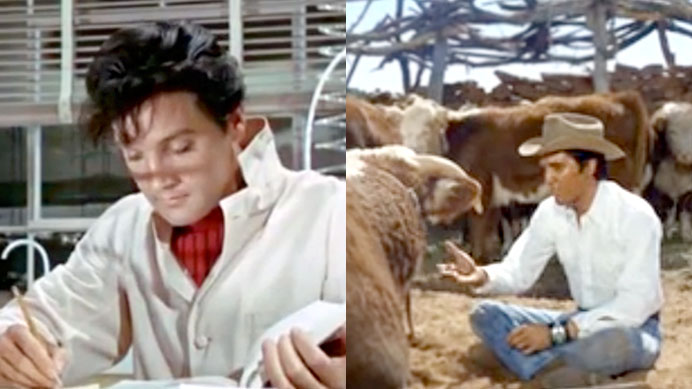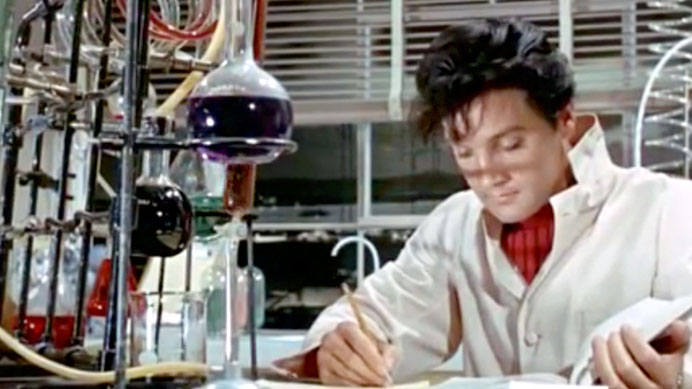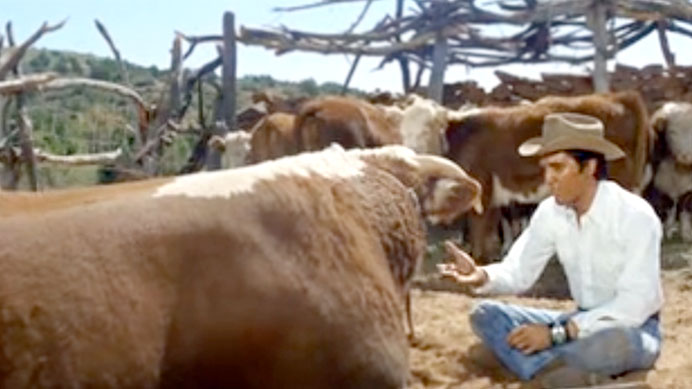
When I first mentioned to Cody that I was going to start this project, his immediate reaction was “Have you seen Clambake!?” The title alone was enough to sell me, but no, I had not heard of this gloriously titled film. Cody couldn’t really remember what Clambake was about, just that it’s bizarre and fun, so all I could hope and expect was that it was just Elvis hangin’ all day at a sweet ass clambake, full of bikini-clad revelers, Beach Boys ripoff songs, and clams a-bakin’.
Well, I wasn’t too far off. Little did I know the horror that was lurking around the corner, though…

Clambake (1967) | 99 min.
Scott Heyward (Elvis Presley) is a poor little rich boy who drives into Miami in a red hotrod car, wearing a white embroidered suit, and decides to swap identities with Tom (Will Hutchins) a waterskiing instructor with no money to his name. They agree the swap will be mutually beneficial, as Tom can’t get a date because of his financial situation, and Scott can’t find true love because women only see his money.
They show up at the hotel where Tom works and Tom, disguised as Scott, books their finest suite after dropping Scott’s name. Scott, meanwhile, disguised as Tom, signs up his first student—attractive hotel guest Dianne (Shelley Fabares), after she notices wealthy playboy James J. Jamison III (Bill Bixby) in the lobby bragging about his speedboat. While out on the water, Scott realizes Dianne doesn’t need lessons at all—in fact, she’s better than him, and does showoff water tricks whenever James’ boat passes by. She lets Scott in on her plan to snag him, and Scott, though clearly disappointed in her lack of interest, agrees to help.
The next day, they go out again, and this time Dianne not only attracts the attention of James, but she loses her bikini top in the water. James agrees to give it back to her if she’ll go have a drink with him. She agrees. Scott weeps internally, then meets up with Tom, and they go hang in a sweet-ass playground (as childless thirty-year-old men are known to do?) and tell kids to have confidence.
Scott decides to enter an upcoming boat race in order to prove his worth to himself and to Dianne. He goes to local boat guy Sam Burton (Gary Merrill) who likes the cut of his jib and decides to sponsor him. Sam says he can use his speedboat, but that he has to figure out how to make the hull not break apart when it hits 90mph. If he can do it in two weeks, he can keep half the purse.
Clambake time! There’s bikini women shaking their asses next to plates of lobsters, and men dancing on rooftops, but I’m not seeing any clams. Scott sings while barbecuing. James tells him he should stay in his own caste and not bother entering the race. Dianne sorta shrugs at him. Scott seethes.
Reinvigorated with hatred, Scott lets Sam in on a secret—that he used to major in engineering at university, and previously developed a hardener called Goop, that you can put on anything and it won’t break. Scott then turns Sam’s place into a makeshift laboratory in order to develop more Goop. Dianne comes to visit him, and he warns her that James will put the moves on her soon—invite to his room, pheasant dinner and cherry jubilee—and she can expect an engagement out of it. He also fixes her hair and makeup and tells her James is a moron if he doesn’t propose. Dianne is touched, but goes back to James anyhow.
Meanwhile, Scott’s father, Duster Heyward (James Gregory) finds out Scott requested the Goop formula from their company, and decides to go down to Miami to find his missing son. He runs into Sam, who realizes the switcheroo that has happened, and informs Mr. Heyward of it. Heyward then confronts Scott, but Scoot says he just wants to prove himself. Mr. Heyward and his son have a moment.
James does exactly what Scott predicts he’d do, so Dianne gets cold feet and runs out on him. Scott, of course, just happens to be by James’ room at the time, and James blames Scott for it all and challenges him to a karate fight. Scott punches him in the face and James passes out. Scott sings his pain out in the palm trees, and Dianne finds him and tells him she couldn’t go through with the engagement. But she also tells him she’s going home tomorrow after the race.
They race, the Goop works, Sam wins and is so proud that he proved himself to his father and Dianne. (I hate to break it to you Sam, but your rich and fancy education is really what won you that race. Something that, while yes, you did by yourself, was birthed out of money. Had you actually been Tom, you would still be alone and poor. Just sayin’.) He picks up Dianne in his original hotrod car and proposes to her. She agrees, but tells him to return the ring, because they can’t afford it. He finally admits to her what his real identity is (son of an oil tycoon) and she faints.
What I wanted out of Clambake was a bland, beach-centric movie with inexplicable music and tons of crazy kids just dancing it up into the wee hours of the morn. What I got was a surprisingly coherent story with (mostly) plot-forwarding musical numbers, simple yet believable characters, and only one throwaway beachfront party scene. I’m impressed! It’s been a while since I enjoyed the actual plot of one of these films, and Clambake works. You can tell the Colonel actually made a real effort to step up the script for once—Elvis was so bored out of his mind he was becoming difficult to deal with otherwise.
Elvis looks about as miserable as ever, though. I’ve never seen him look so haggard. There are immense dark circles under his eyes that make you wonder if they just forgot to light him for the film, but it was probably more a product of his drug regimen, his recent semi-forced marriage to Priscilla, the feeling of stagnation that was setting in on his career.
However, the chemistry between him, Shelley Fabares, and Will Hutchins really helps keep the film moving. Fabares shines as the nice girl who’s looking out for her own financial security. (Finally, she gets a role with some decent character development and semi-okay dialogue.) The part of the hopeless romantic in search of true love comes to Elvis pretty naturally—this is the exact role he not only looks perfect for, but also can draw upon his own life as source material for. Unfortunately, this role seems to have come a bit too late in his career for him to really put his all into it. But he does keep the movie at least somewhat compelling.
Best Song: In true musical style, the music in Clambake seems mostly written to further the story, and I will give it props for that, even though it’s mostly terrible. I did like “But You Don’t Know Me,” a cute if not slightly sappy song about self pity.
However, the best worst song is “Hey Hey Hey,” a nonsense song full of cheesy dancers shellacking the exterior of a boat. Best part is that it ends with Elvis saying “Before I’m done / Lets have some fun / I’m gonna kiss you all one by one” and then proceeds to kiss every girl on the lips.
2 1/2 out of 5 Stars,
1 1/2 out of 5 Elvises



Stay Away, Joe (1968) | 102 min.
Wow. This one ranks up there as not only one of the worst Elvis movies, but perhaps one of the most insufferable films ever made. Why oh why did they choose this one to break the formula of the 90-minute breezy Elvis movie?
Joe Lightcloud (Presley) is coming back home to his Navajo family who live on a reservation somewhere out in Arizona. He’s persuaded a local congressman (Douglas Henderson) to give his father Charlie (Burgess Meredith) a herd of government cattle to prove that Indians are hard working and capable. If they can prove it after x amount of time, they’ll get more government funding. (Stay away, Joe, I’m tellin’ ya.)
Joe’s family, and the entire reservation, are mostly made up of drunk party animals. A ten-minute scene in which every single person drives up to Charlie’s house happens, followed by another twenty minutes of just people drinking and fighting. Joe’s sister Mary (Susan Trustman) is like “Joe, why did you come back? Why help Charlie when you should be helping yourself?” Joe replies, “Well, I just want to know this place still exists.” (Joe, honestly, stay away, please.)
The next morning, they realize the cow they decided to slaughter and eat was actually the bull of the herd, and now they’re totally screwed. He sends his friend Bronc (L. Q. Jones) to get them a new bull while he goes and seduces the teenage daughter (Quentin Dean) of Glenda (Joan Blondell) an older woman that he clearly had a fling with. Glenda finds out and starts shooting at him with a rifle. Bronc eventually brings Joe a new bull, but it’s lazy and spends all day sleeping. Joe sings a song to the bull and tries to talk it into being more interested in all those lady cows. (Joe, PLEASE. Just… please. Go.)
Eventually, Charlie and the family start to sell off the extra cattle for home improvements such as wallpapering the exterior of their shack with ‘bricks’ and putting in a toilet with no plumbing. Joe then punches his friend in the face for giving him a bad bull. His friend laughs and says “Joe! He’s a rodeo bull!” So Joe makes back a ton of money riding this unrideable rodeo bull and buys back a hundred cattle just in time to show the congressman they’re not complete lost causes. The movie ends in what amounts to a twenty-minute brawl scene—Mary’s fiancé’s mom comes to visit, resulting in disaster, and Glenda is still shooting at Joe trying to get him to marry her daughter. (JOE, WHAT DID I TELL YOU.)
So first off, this movie is just cartoonish in the worst possible way. The humor is reliant on the idea that drinking beer and slugging people is inherently funny or somehow fun to watch. It’s the same lazy humor we already saw in the throwaway Follow That Dream or the eye-roller Kissin’ Cousins. In fact, throw both of those movies together—the low IQ humor, and the childish airhead women and womanizing—and you basically have this one. Oh, plus wrestling. When they’re not drinking or womanizing, all of these 30+ year old men are just wrestling each other in the mud and dirt. This was Elvis’ favorite pastime on set anyhow with his entourage, so I get the sense the director was just like, hey, throw it in there, why not. They’re just going to do it anyhow.
Or, maybe I should have lead off with the fact that this movie is mad racist! Elvis is a Native American again, and this time instead of dying for his heritage and dignity by riding into that Flaming Star, he is a rough housin’, heavy drinkin’, do-nothin’ womanizer—and he’s meant to be the best of the bunch! With terrible stereotypes about lazy Indians abound, even ’60s reviewers blasted the movie for being offensive.
I can’t tell you how grating and god awful the acting is in this. The winner of worst character in the film is split between L.Q. Jones’ Bronc, the hatable idiot friend who literally can’t do anything other than laugh hysterically and not keep his hands off of Elvis, or Quentin Dean as Mamie the 19-year-old who acts like a whiney and obnoxious 9-year-old but looks like a tween sex doll. I will admit, Elvis, again, for the millionth time, is the saving grace of this film– though not by much. Mostly, he just provides the only two reasons to see the movie. The first of which is the opening scene of Elvis herding a group of cattle with his white Cadillac (yes, actually!) and the second being Elvis (probably not Elvis) riding back home on the back of a bucking bull. That’s it. Those are the only redeeming moments of the movie.
What a disappointment too, because finally for the first time in years we have a movie that doesn’t follow the typical Elvis-slump formula. It’s shot without the typical Hollywood lot sets, the forced musical aspect is kept to a bare minimum, and it’s close to two hours long. Unfortunately, while they adhered to some of Elvis’ requests, they forgot the other stuff, such as plot, character development, and intelligence. Hell, the camerawork even reminds me of Terry Gilliam at his worst, but without actually going for the full fisheye effect.
Best Song: The music in this movie could have been the saving grace, but they drop the ball–it’s got a bluegrass and country feel, a lot of fingerpicking and banjos, but nothing memorable or innovative. The best song and perhaps third redeeming moment of this film is “All I Needed Was The Rain” a song in which Elvis, who refuses to sleep indoors because he’s BEEN OUT ON THE RANGE TOO LONG TO GO BACK TO SLEEPIN’ INDOORS or something gets waterlogged while sleeping in a stripped convertible with a buncha dogs. Scenario aside, it’s actually a great bluesy song.
1/2 out of 5 Stars,
1 out of 5 Elvises

Back to Jenna Does Elvis #12 | Forward to Jenna Does Elvis #14
Music note: you didn’t seem to recognise You Don’t Know Me. An old country song originally cut by the Colonel’s other protege Eddy Arnold, although his version is now less well-known than either Elvis’s (I’m disappointed, he sounds as if he’s not sure how to sing it) or Ray Charles’s (I’m appalled, wretchedly MOR and soppily-arranged).
I should pity you for being unable to enjoy Stay Away Joe simply because you’re too “politically-correct”, too busy looking with a fine-tooth comb for insults to groups of people, insults which here, as usual, don’t actually exist, except in the minds of the paranoid and the power-hungry. (Though you’ll deny it, what you’re arguing for – at the back of your mind perhaps – is censorship – starting with the rewriting of film history by the deleting of “politically incorrect” films like this one. Censorship being the definitive dehumanizing, degrading act one human can perpetrate against another. Mouth-noises do not psychologically damage people with fully-functioning brains – but limitations on freedom of expression exert potentially catastrophic damage on everyone. Including you, evidently.)
Hi GRITHRON2, not sure what you’re going on about as I’m arguing for neither the censorship nor the erasure of Stay Away, Joe. I’m just simply pointing it out for what it is– a blandly shot, lazily written and poorly acted film which has aged terribly.
Stay Away Joe seems to have been a movie that was already dated by the time it premiered… according to Alan Hanson over at Elvis History Blog several reviews that came out in ’68 also called this film out on its negative Native American stereotypes (http://www.elvis-history-blog.com/stay-away.html). I’d also recommend “Other Words: American Indian Literature, Law, and Culture” By Jace Weaver if you’re looking for more information on what those stereotypes are– there’s a couple of pages on this movie itself and it’s available on Google Books.
While its overwhelmingly negative portrayal of Native American life and generally insulting portrayal of women certainly contributes to it being an eye-bleedingly awful watch, if you read my review you’ll see those are one of many aforementioned reasons as to why this movie is a failure.
Best,
Jenna
Really interesting reviews. Actually quite fond of the Ray Charles “You Don’t Know Me” (despite an earlier comment by Grithiron).
What I liked about your approach was that you didn’t go for the cheap shots and while I’m not a fan of Elvis as an actor I do give the guy a break for trying. It must have been so soul-destroying to have to do all those dumb movies and just hoping to break out into the Tony Curtis he always wanted to be. So it was nice to read something which didn’t just point and deride. Not sure about the racist thing but I take your point. I feel the same way about Peter Sellers in “The Party” but PS brings a pathos to the character that EP didn’t in “Stay Away Joe”. All about finding the right vehicle for your talent and it worked in “King Creole” and then…nada. I don’t think it’s being “politically correct” to point out that something has racial undertones if it’s taken in the context of a racially-segregated time. Personally, I dislike blanket statements without context but you handled the case well in terms of stereotyping – Elvis would NEVER have gotten away with a Darby O’Gill act.
as for elvis’s appearance during clambake and black circles under the eyes…..during the filming of this he had a bad accident at his circle g ranch where he ended up in hospital for a few days with serious concussion.